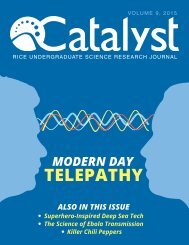You also want an ePaper? Increase the reach of your titles
YUMPU automatically turns print PDFs into web optimized ePapers that Google loves.
Report<br />
SC Type<br />
Used<br />
Culture<br />
Format<br />
Percent of β-<br />
cells<br />
In-Vivo reversal<br />
of diabetes?<br />
Rezania et<br />
al., 20<strong>14</strong><br />
iPSC<br />
Air-liquid<br />
interface<br />
~40%<br />
(NS+/NKX6-<br />
1+)<br />
Yes (40 days)<br />
Pagliuca et<br />
al., 20<strong>14</strong><br />
iPSC<br />
Spinner<br />
flask<br />
33 +/- 3%<br />
(CP+/NKX6-1+)<br />
Yes (18 days)<br />
Millman et<br />
al., 2016<br />
iPSC<br />
(T1D+)<br />
Spinner<br />
flask<br />
24 +/- 2%<br />
(CP+/NKX6-1+)<br />
Yes<br />
Millman et<br />
al., 2016<br />
iPSC<br />
(ND)<br />
Spinner<br />
flask<br />
27 +/- 2% (CP+<br />
/NKX6-1+)<br />
Yes<br />
Fig 1. Adapted from Millman & Pagliuca (2017)<br />
The various protocols involve adding or restricting<br />
various signaling molecules to induce<br />
differentiation, causing undifferentiated iPSCs<br />
into mature iPSC derived β-cells. For example,<br />
Pagliuca et al., (20<strong>14</strong>) demonstrated that exposing<br />
the iPSCs (OCT4+ and NANOG+) to Nodal and Wnt<br />
caused differentiation into definitive endoderm<br />
(SOX17+ and FOXA2+). Then, exposing definitive<br />
endoderm cells to RA, FGF, and PKC, while<br />
removing BMP and SHH, caused<br />
differentiation into pancreatic progenitors (PDX1+<br />
and NKX6-1+). Then, exposing pancreatic<br />
progenitors to EGF, triiodothyronine, RA, while<br />
removing Alk5, SHH, y-secretase, and BMP,<br />
caused differentiation into endocrine progenitors<br />
(CHGA+ and NKX6-1+). Finally, exposing<br />
endocrine progenitors to further triiodothyronine<br />
and vitamin E, while removing ALK5 and AXL,<br />
caused differentiation into iPSC derived β-cells<br />
(Pagliuca et al., 20<strong>14</strong>; Millman & Pagliuca, 2017).<br />
Matured iPSC derived β-cells are often<br />
characterized by expression of NKX6-1, PDX1,<br />
MAFA, GLIS3, and MNX1. However, most iPSC<br />
derived β-cells do not express MAFA and GLIS3,<br />
which is expressed by normal adult β-cells.<br />
Thus, it is important to remember that stem cell<br />
derived β- cells, from both iPSC and ESC<br />
sources, are not actually normal adult β-cells<br />
(Millman & Paglucia, 2017; Sipioine et al., 2004).<br />
Despite the differences, iPSC derived β-cells<br />
mimic normal adult β-cells, in both in-vitro and<br />
in-vivo settings. iPSC derived β-cells respond to<br />
elevated glucose levels with (1) increased<br />
intracellular Ca2+ concentrations, and (2)<br />
release of insulin and c-peptide. The insulin is<br />
even secreted in secretory granules, however<br />
the concentrations of glucose contained within<br />
are lower than their normal adult β-cells<br />
counterparts (Pagliuca et al, 20<strong>14</strong>; Rezania et al.,<br />
20<strong>14</strong>; Millman et al, 2016).<br />
Despite the lower insulin concentration,<br />
transplanted iPSC derived β-cells demonstrate<br />
reliable insulin secretion in response to<br />
sequentially induced hyperglycemia in<br />
immunosuppressed mice models. Furthermore,<br />
both iPSC derived β-cells from T1D patients and<br />
non-diabetics responded equally well to glucose<br />
challenges in vitro and in mice models. This<br />
provides evidence that iPSCs from T1D patients<br />
would be viable sources of β-cells for<br />
autologous transplant, meaning that future T1D<br />
β-islet transplant candidates would not need to<br />
receive β- cells from non-diabetics, avoiding the<br />
risk of allogenic rejection (Millman et al, 2016).<br />
Furthermore, it provides evidence that T1D<br />
patients’ β-cells would be functional in the<br />
absence of an overactive immune system.<br />
2 2 | C A T A L Y S T 2022-2023


![[Rice Catalyst Issue 14]](https://img.yumpu.com/68409376/22/500x640/rice-catalyst-issue-14.jpg)

![[Catalyst 2019]](https://documents.yumpu.com/000/063/794/452/bc6f5d9e58a52d450a33a2d11dbd6c2034aa64ef/47664257444a666654482f6248345756654a49424f513d3d/56424235705761514739457154654e585944724754413d3d.jpg?AWSAccessKeyId=AKIAICNEWSPSEKTJ5M3Q&Expires=1715796000&Signature=KJwzxMMJ40R7i7tNeeBjATzFUYs%3D)
![[Catalyst Eureka Issue 2 2018]](https://img.yumpu.com/62125575/1/190x245/catalyst-eureka-issue-2-2018.jpg?quality=85)
![[Catalyst 2018]](https://img.yumpu.com/62125546/1/190x245/catalyst-2018.jpg?quality=85)
![[Catalyst Eureka Issue 1 2017]](https://img.yumpu.com/58449281/1/190x245/catalyst-eureka-issue-1-2017.jpg?quality=85)
![[Catalyst 2017]](https://img.yumpu.com/58449275/1/190x245/catalyst-2017.jpg?quality=85)
![[Catalyst 2016] Final](https://img.yumpu.com/55418546/1/190x245/catalyst-2016-final.jpg?quality=85)
